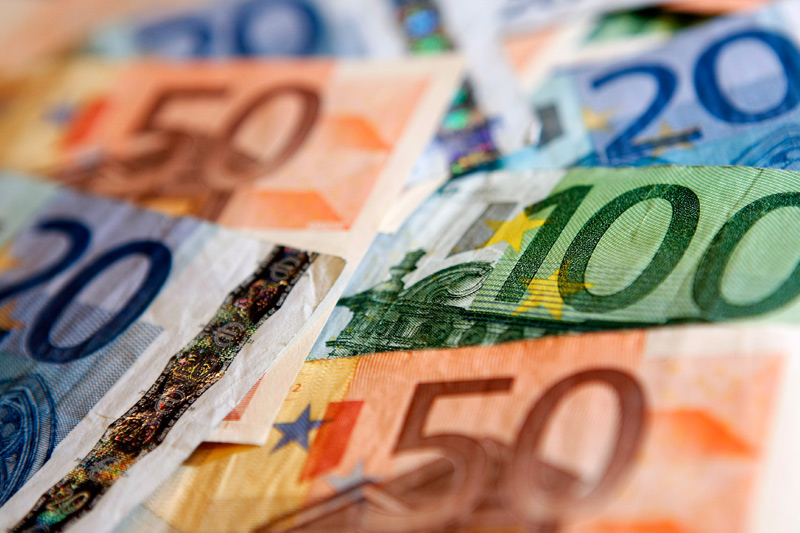Investing.com - The euro was stronger against the other major currencies on Wednesday, after ratings agency Moody's affirmed Spain’s credit rating, while ongoing speculation that Madrid is moving closer to asking for a bailout also lent support.
During European early afternoon trade, the euro advanced to a one-month high against the U.S. dollar, with EUR/USD up 0.56% to 1.3126.
Moody’s confirmed Spain’s credit rating at Baaa3 with a negative outlook earlier, just one notch above junk status, and expressed confidence that reforms enacted by the Spanish government and the European Central Bank’s bond buying program would ensure that Madrid had continued access to credit markets.
The yield on Spanish 10-year bonds fell to 5.53% following the announcement, the lowest level since April.
Sentiment on the euro has been underpinned in recent weeks by hopes that Spain will soon request a bailout from its euro zone partners, but uncertainty over the timing of a request and what form a bailout would take has persisted.
The single currency was trading close to a four-month high against the pound, with EUR/GBP up 0.17% to 0.8115.
Sentiment on sterling was boosted after official data showed that the number of people claiming jobless benefit in the U.K. fell by 4,000 last month, compared to expectations for a decline of 1,000, bringing the unemployment rate down to 7.9% from 8.1% in August.
Separately, the minutes of the Bank of England’s October meeting showed that policymakers voted in favor of leaving the size of the bank’s asset purchase program unchanged at GBP375 billion and interest rates at a record low 0.5% this month.
However, the minutes indicated that policymakers disagreed over whether more easing will be required when the current round of asset purchases ends later this month.
The euro gained ground against the yen and the Swiss franc, with EUR/JPY rising 0.25% to 103.22 and EUR/CHF easing up 0.14% to 1.2104.
Earlier Wednesday, a report showed that the ZEW index of Swiss economic sentiment improved to a five month high of minus 28.9 in October from a reading of minus 34.9 in September.
The shared currency was mixed against the Australian, New Zealand and Canadian dollars, with EUR/AUD dipping 0.09% to trade at 1.2691, EUR/NZD slipping 0.12% to 1.6012 and EUR/CAD up 0.28% to 1.2914.
Later in the day, the U.S. was to publish government data on building permits and housing starts.
During European early afternoon trade, the euro advanced to a one-month high against the U.S. dollar, with EUR/USD up 0.56% to 1.3126.
Moody’s confirmed Spain’s credit rating at Baaa3 with a negative outlook earlier, just one notch above junk status, and expressed confidence that reforms enacted by the Spanish government and the European Central Bank’s bond buying program would ensure that Madrid had continued access to credit markets.
The yield on Spanish 10-year bonds fell to 5.53% following the announcement, the lowest level since April.
Sentiment on the euro has been underpinned in recent weeks by hopes that Spain will soon request a bailout from its euro zone partners, but uncertainty over the timing of a request and what form a bailout would take has persisted.
The single currency was trading close to a four-month high against the pound, with EUR/GBP up 0.17% to 0.8115.
Sentiment on sterling was boosted after official data showed that the number of people claiming jobless benefit in the U.K. fell by 4,000 last month, compared to expectations for a decline of 1,000, bringing the unemployment rate down to 7.9% from 8.1% in August.
Separately, the minutes of the Bank of England’s October meeting showed that policymakers voted in favor of leaving the size of the bank’s asset purchase program unchanged at GBP375 billion and interest rates at a record low 0.5% this month.
However, the minutes indicated that policymakers disagreed over whether more easing will be required when the current round of asset purchases ends later this month.
The euro gained ground against the yen and the Swiss franc, with EUR/JPY rising 0.25% to 103.22 and EUR/CHF easing up 0.14% to 1.2104.
Earlier Wednesday, a report showed that the ZEW index of Swiss economic sentiment improved to a five month high of minus 28.9 in October from a reading of minus 34.9 in September.
The shared currency was mixed against the Australian, New Zealand and Canadian dollars, with EUR/AUD dipping 0.09% to trade at 1.2691, EUR/NZD slipping 0.12% to 1.6012 and EUR/CAD up 0.28% to 1.2914.
Later in the day, the U.S. was to publish government data on building permits and housing starts.
